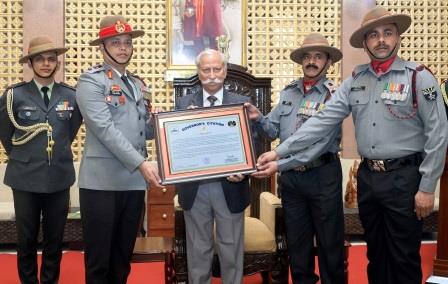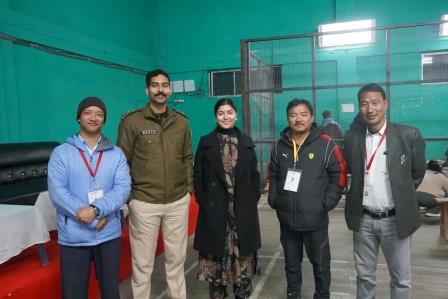-
Arunachal witness peaceful, enthusiastic local body elections
-
 Governor presents Governor’s Citation to 11 Assam Rifles
Governor presents Governor’s Citation to 11 Assam Rifles
-
 Panchayat election conducted smoothly across Keyi Panyor
Panchayat election conducted smoothly across Keyi Panyor
-
SEC announces re-poll at Laho-II
-
Defence Estates Itanagar Circle conferred Raksha Mantri Award for…
-
Local NGO gets Centre’s attention for combating river pollution
-
.jpg) Arunachal Wushu athletes script record at Nordic Open Championship in…
Arunachal Wushu athletes script record at Nordic Open Championship in…
-
Panchayati Raj polls conclude peacefully in Rural Papum Pare
-
Arunachal Kho-Kho team heads to Ayodhya for 69th SGFI…
-
10 govt schools upgraded with solar power, smart…
NEW DELHI, Jun 18: It will be green-coloured ballot papers for members of Parliament and pink for MLAs who vote in the presidential election on July 17.
In case the NDA and the opposition field their own candidates and none withdraws till July 1 evening, the Election Commission will initiate the process of "final printing" of ballot papers as a contest would then become imminent.
The value of an MLA's vote depends on the population of the state he or she represents. But the value of the vote of an MP does not vary -- it is 708.
Hence, the different colour of ballot papers will help the returning officer count the votes based on the value.
The total value of the electoral college is 10,98,903.
The ballot boxes will be brought to Delhi for counting on July 20.
The electoral college which elects the president through the system of proportional representation comprises elected MPs and members of state legislative assemblies -- a total of 4,896 voters including 4,120 MLAs and 776 elected MPs.
While 233 are elected members of the Rajya Sabha, 543 are from the Lok Sabha.
In a set of directions issued to the states, the Commission has said that while "the ballot papers for use by elected members of both houses of Parliament shall be printed on green coloured paper, those for use by elected members of legislative assemblies shall be printed on pink coloured paper."
Ballot papers for Arunachal Pradesh, Bihar, Chhattisgarh, Haryana, Himachal Pradesh, Jharkhand, Madhya Pradesh, Meghalaya, Mizoram, Nagaland, Rajasthan, Uttarakhand, Uttar Pradesh and NCT of Delhi, which are to be printed in English and Hindi, will be printed here by the poll panel itself.
But ballot papers for Andhra Pradesh, Assam, Goa, Gujarat, Jammu and Kashmir, Karnataka, Kerala, Maharashtra, Manipur, Odisha, Punjab, Sikkim, Tamil Nadu, Telangana, Tripura, West Bengal and Puducherry, which are required to be printed in languages other than Hindi (and/or) English, will be printed in the respective states.
Electronic voting machines are not used in these elections as EVMs are formatted for first-past-the post system of voting.
"They are not meant for proportional representation by means of single transferable vote," Chief Election Commissioner Nasim Zaidi had said while announcing the presidential polls.
Following the ink controversy in the Rajya Sabha polls in Haryana last year, the Commission has decided to use special pens for the electors to mark their votes in the presidential election.
"For marking the votes, the Commission will supply particular pens. This pen will be given to the electors in the polling station by the designated official when the ballot paper is handed over. Electors have to mark the ballot only with this particular pen and not with any other pen. Voting by using any other pen may lead to invalidation of the vote," Zaidi had said.
The decision to use special pens is based on the recommendations made by a working group set up by the poll panel to suggest ways to avoid repeat of such disputes in future polls.
Twelve votes marked using a wrong pen were declared invalid leading to the defeat of Congress-backed independent candidate R K Anand, a lawyer, to media baron Subhash Chandra.

Kenter Joya Riba
(Managing Editor)She is a graduate in Science with post graduation in Sociology from University of Pune. She has been in the media industry for nearly a decade. Before turning to print business, she has been associated with radio and television.
Email: kenterjoyaz@easternsentinel.in / editoreasternsentinel@gmail.com
Phone: 0360-2212313

